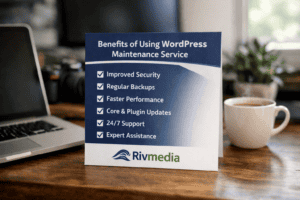Table of Contents
Mitigating the potential risks your business might face in the coming year helps ensure you can ride the ups and downs of running your own company without crashing. While it’s impossible to predict everything that might happen, there are some common pitfalls to running a small business for which you can prepare.
In the latest report from the United States Small Business Administration, experts showed the survival rate of new businesses is 67.6% in the first two years. The number drops to 33.6% at the ten-year mark and a dismal 25.7% for fifteen years.
As many small business owners learned in 2020, sudden disasters can cause a massive shift. When shutdowns occurred due to the COVID-19 pandemic, many companies floundered due to lack of planning for such an event. Not every brand could pivot and figure out how to stay in business.
Pandemics aren’t the only threat businesses face either. Below are the 10 most common potential risks and how to prepare for them now. A little forward thinking may mean the difference between long-term success and failure for your company.
1. Economic Uncertainty
The economy runs in cycles. Different factors impact it in various ways. Some elements are predictable if you look at patterns, but others aren’t. For example, the pandemic of 2020 wasn’t something anyone expected.
Your best defense against economic fluctuations is keeping healthy cash flow. Lack of cash during growth stages is one reason many companies cite failure. When things are going well, set aside a rainy day fund.
Even if the economy remains strong, you’ll have enough cash to scale growth. You can invest in a terrific deal, upgrade equipment when it fails and pour more money into marketing.
2. Burglaries
If you run a brick-and-mortar store or own a warehouse, the potential for theft is always present. Most insurance policies don’t cover losses due to burglary. Getting police to respond quickly increases the odds they’ll catch the perpetrators.
It makes sense the faster you catch culprits, the more likely you’ll recover some if not all of your stolen goods. Invest in a strong security system with cameras to capture footage of illegal activity and notify law enforcement instantly.
3. Compliance Regulations
Depending on what type of business you run, you may be subject to any number of regulations in your area and globally. For example, the General Data Protection Regulation (GDPR) out of the European Union (EU) applies to any country doing business or collecting information from citizens of EU countries.
If you sell a product on your website to someone who lives in France, you may fall under GDPR if you don’t take steps to protect your customers’ information. Know the laws for your industry.If you fail to follow the rules, you could be hit with fines by any number of regulatory companies, including the EU, OSHA and the EPA.
4. Damaged Reputation
At some point in every business’ lifespan, mistakes cause a crisis of some sort. Perhaps you release a faulty product, your employees lack customer service skills or delivery times become lengthy. Whatever the reason, a sudden influx of poor reviews might harm your overall brand name and cause a loss of revenue.
Your best line of defense is by keeping an eye on what people say about you online. You can set up alerts to notify you anytime your brand name pops up. You should also monitor social media mentions. If you see bad reviews, stop and fix whatever issue caused them and address them immediately.
Keep the name of a reputation management firm on hand in case you need to enlist their services. PR companies sometimes offer this service and will help you spin the situation to your favor.
5. Data Breaches
The pandemic forced many companies to move to a remote model. Cybercriminals everywhere rejoiced at the increased opportunities to steal personal data. IBM’s 2020 Cost of Data Breach Report uncovered an increased cost to brands of $137,000. About 76% of survey participants indicated the nature of remote work would mean a longer time to identify and contain a data breach.
You might think cybersecurity is a more significant concern for large corporations, but many small businesses face the threat of an attack. Now is the time to shore up your security. Invest in virus protection, change passwords regularly and train your employees how to avoid compromising their computers and accounts.
6. Natural Disasters
No matter where your business resides, there is some type of natural disaster potential. If you’re on the west coast, you may worry about earthquakes. The Florida panhandle is subject to hurricane force winds. The midwest often brings flooding and soaring summer temperatures.
Spend time writing out the potential natural disasters which might occur in your area. Have a plan in place for how you’ll respond. Your first priority should always be getting humans to safety. Your employees and customers should go home when impending weather looms.
Know how you’ll stay afloat if the worst happens. Have insurance adjustor numbers close at hand, so you can call and get on the list for an assessment. Is there a backup location where you can run a pop-up shop for a few weeks? Do you have enough cash on hand to pay employees even if you’re closed? You don’t want to lose your highly skilled workers.
7. Sudden Marketplace Changes
Did your business do a pivot during the COVID pandemic? People’s spending habits changed on a dime with many buying only essential items. Distilleries changed their operations over to make hand sanitizer for first responders and their customers. Restaurants adopted a curbside and delivery model to keep things running.
What happens when life as you know it changes due to no fault of your own? Is your business prepared to pivot and do so quickly? One way to prepare is to write out some potential scenarios, such as a second pandemic, wildfires, floods, sudden crime, etc. How would you respond to each situation?
While you might face something totally different than expected, training yourself in a pivot mindset may be all that’s needed to adapt quickly. You should also encourage your staff to share out-of-the-box thinking on a regular basis. You never know when you might need their fresh ideas to stay in business during a catastrophe.
8. Lack of Employees
The worker shortage isn’t just hitting the United States. The United Kingdom faces a similar issue. Industries such as restaurants and trucking have a hard time filling empty positions. People refuse to work for low pay and high risk.
In April, four million people resigned from their positions with about 649,000 of them being retail employees. Businesses already struggling from lower income due to the pandemic may have a hard time paying workers more and thus suffer from lack of staff when they need it most.
While you can only pay what you can afford to workers, you can develop a strong company culture to lift them up and show them you care. Pay for training, give them some perks the big companies don’t and treat them as though you value them. If you don’t, you can be sure another company will.
9. Competition
Many people got used to staying home during the pandemic. Some decided to start their own businesses, no longer content to work for someone else. For a few, they were laid off and had no choice but to figure out how to create their own income.
You may even find some of your old employees started a business directly competing with you. After all, they know how you run your company and they likely have the insider information needed to operate efficiently.
The only way to stay on top of new competition is to actively seek information on what’s available in your industry. Pay attention to the unique value proposition (UVP) of your nearest competitors. What do they claim to do well? How is your UVP different? Note areas of weakness they have and make those things your strengths.
Do an assessment every few months, mapping the areas where your competitors have a presence. Pay attention to their marketing, new products and local events. You can’t keep up with the competition if you don’t have a clear idea of what they’re doing and how best to compete.
10. Automation
The pandemic also increased the shift toward a more autonomous world and remote work environment. Figuring out how to automate some industries is quite a challenge and there is a big risk you could fall behind due to the expense of investing in new equipment and technologies.
Look at the things taking up most of your employees’ time. What elements are repetitive? Could a machine do a faster and better job on some things?
As more businesses turn to ordering kiosks and remote work, expect the cost of equipment and services to come down a bit. Invest in those things that make the most sense for your business model and wait on the ones that don’t. Make sure your workers know you are changing their roles and not doing away with them. You don’t want to lose valuable employees in the middle of a labor shortage.
Plan for the Worst
Create a plan for what might happen. Expect the best but if anything else occurs, you’ll be ready for the risk and able to make a sudden shift to ensure your business continues on successfully. Any business faces hundreds of potential risks, but the benefits far outweigh them. Plan but don’t worry as some things may never occur. If they do, though, you’ll be prepared.










